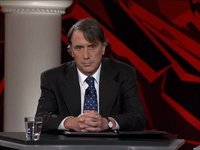This House believes this Afghan government is not worth fighting for
Tuesday January 12 2010
MOTION PASSED
by 51% to 49%
Transcript
Order of speeches
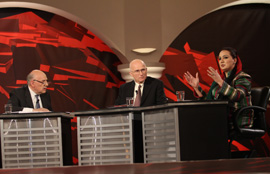
- Introduction
- Peter Galbraith
- Shukria Barakzai
- Mirwais Yasini
- Lawrence Korb
- Audience questions
- Vote result
Introduction
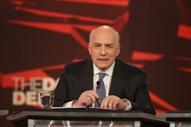 TIM SEBASTIAN
TIM SEBASTIAN
Ladies and gentlemen, a very warm welcome to the latest in our series of Doha Debates, coming to you from the Gulf State of Qatar and sponsored by the Qatar Foundation. Back in October 2001 it seemed to Britain and America like a perfect plan, bomb Al-Qaeda out of Afghanistan, end the drug trafficking and help to install and support a new democratic government. But it didn't work out that way. Nearly nine years later Western forces are bogged down in an increasingly bitter war with the Taliban. Democratic elections have been tainted by widespread fraud; the narcotics trade and corruption have proved endemic. Now many voices in the West are expressing the view contained in our motion tonight, ‘This House believes this Afghan government is not worth fighting for'. But what do you think? Our panel brings a high level of expertise from inside and outside Afghanistan. Speaking for the motion, Peter Galbraith, a former UN envoy to Afghanistan, who says the UN covered up election fraud in the country. Alongside him, Mirwais Yasini, First Deputy Speaker of the Lower House of the Afghan Parliament. Last year he ran a brief and unsuccessful campaign for the Presidency. Against the motion, Shukria Barakzai, one of only a handful of female members of the Afghan Parliament, and a prominent women's rights campaigner. And with her, Lawrence Korb, Defence Analyst and former Assistant Secretary of Defence in the Reagan Administration. Ladies and gentlemen: our panel. So now let me call first on Peter Galbraith to speak for the motion please.
Peter Galbraith
Speaking for the motion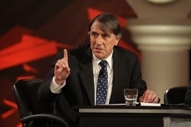
PETER GALBRAITH
Thank you. President Hamid Karzai has been in office in Afghanistan for eight years, and those eight years have been characterised by ineffectiveness, toleration of corruption, a deteriorating security situation. And this year he begins a new term in office, as a result of an election that was massively fraudulent. Of the three million votes that were cast for Hamid Karzai in the last election, EU monitors say that at least a million were phoney. Based on my experience with the United Nations of monitoring and supporting the election, we noted that in parts of the country, including Kandahar, the second largest province, fewer that ten percent of the people actually voted, while returns were reported in the range of thirty percent for Kandahar City, up to over one hundred percent in some of the outlying districts. Now a government that is corrupt, ineffective, that cannot manage the security situation, is one that does not merit support, one that is in office by fraud is one that does not merit support. But my argument does not depend on the rights or wrongs of the Karzai administration; rather it depends on the prospects for success. The United States and its allies are engaged in a counter-insurgency campaign in Afghanistan. For that counter-insurgency campaign to work, the United States and its allies need a credible local partner. When US and allied troops go into a district it can clear the district of the Taliban, but then it needs the Afghan army to provide security, Afghan police to provide law and order and most importantly an Afghan government that can provide honest administration, public services and that can win the support of the people. A government that is ineffective and in office by fraud cannot win the support of the population, therefore the counter-insurgency strategy cannot work.
TIM SEBASTIAN
Peter Galbraith, thank you very much indeed. The logic of your position seems to be that you want the troops to leave until there's a government that is more acceptable to NATO. Is that right?
PETER GALBRAITH
No, but I don't believe that sending additional troops makes sense.
TIM SEBASTIAN
But you want them to keep fighting, the troops that are there.
PETER GALBRAITH
I think there are things that can be done in parts of the country that keep the situation from getting even worse.
TIM SEBASTIAN
But by staying and fighting they're supporting the remit of the Karzai government aren't they? They are reinforcing the remit of that government.
PETER GALBRAITH
No, and this motion I think it's very important, this motion is not saying that Afghanistan is not worth fighting for.
TIM SEBASTIAN
No?
PETER GALBRAITH
The motion is that: This House believes that this government, the Karzai government, is not worth fighting for.
TIM SEBASTIAN
But there is no other government.
PETER GALBRAITH
Under the circumstances additional troops, as part of a counter-insurgency strategy, which involves having a credible local partner, cannot accomplish their mission.
TIM SEBASTIAN
But this is the government, however ineffective, however corrupt, however it fails to meet your expectations or the expectations of the West. It's the one they voted for, albeit there was massive fraud, but President Karzai would have won anyway, wouldn't he, even if there hadn't been fraud?
PETER GALBRAITH
Tim, you cannot say that a government that is in office by massive fraud is a legitimate government.
TIM SEBASTIAN
Would he have lost the election?
PETER GALBRAITH
Yes, possibly, we don't know. What we know is that the election commission that he appointed helped perpetrate a fraud in which there were at least a million phoney ballots.
TIM SEBASTIAN
But what do you expect in a country which has gone through what Afghanistan has? It's hard enough to get a fair election in the United States.
PETER GALBRAITH
This is condescending toward the people of Afghanistan. The people of Afghanistan are capable of holding elections, and in fact parts of the election campaign were very impressive.
TIM SEBASTIAN
So clearly he didn't do badly, so that's worth fighting for, isn't it?
PETER GALBRAITH
Mr. Yasini presented their positions, there was a lively debate and there was no violence between the supporters of the different candidates.
TIM SEBASTIAN
So by fighting for this government you are still fighting for the process, aren't you?
PETER GALBRAITH
What failed to happen here, Tim, is that there was not an honest count of the ballots that were cast. That's not a big... that's not a hard thing to accomplish, that could have been accomplished. But Karzai's agents perpetrated massive fraud.
TIM SEBASTIAN
My point is this: by fighting for this government, you are fighting for the process which brought this government to power.
PETER GALBRAITH
What I am opposed to is a military mission that cannot be achieved. Remember, these are young men and women that are putting their lives at risk, this is an enterprise that is costing tens of billions of dollars, and if the mission cannot be accomplished because there isn't a credible partner, because the partner is seen as illegitimate, not just internationally, but by a large segment of the Afghan people.
TIM SEBASTIAN
Okay. And you think there's a credible partner waiting in the wings?
PETER GALBRAITH
Well I can say that this government is not credible or legitimate to a large part of the Afghan people. It cannot do what is required to make a counter-insurgency strategy work.
TIM SEBASTIAN
Peter Galbraith, thank you very much indeed. Could I ask now, please, Shukria Barakzai to speak against the motion.
Shukria Barakzai
Speaking against the motion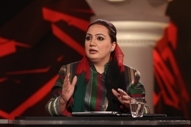
SHUKRIA BARAKZAI
Thank you very much. Good evening. First of all, thanks to the Qatar Foundation and The Doha Debates for giving a chance to Afghans to raise their own voice, and particularly their own points of view. I want to start from the list. Thank God that the legitimacy of the Afghan government is not coming from the address of Mr. Peter Galbraith, a former deputy envoy for the United Nations for Afghanistan. It's coming from the Afghan vote, it's coming from the Afghan population, it's coming with the international identity, as they sent the congratulatory messages for the Afghan people and Afghan President. In the meantime, he is legitimate, not only once, but three times President Karzai got legitimacy. Number one, when it was during the eight years, as you mentioned, there was a temporary Loya Jirga, he got the vote. The second time: the first presidential election, which is Afghan's practising democracy. And the third time was the second presidential election, and now everybody is only talking about the fraud of that election. You will never understand how it's difficult for Afghans to pay with their own lives for having practising democracy, in the name of elections. There were lots of casualties among our police, among our civilians, and there are lots of people putting their own lives at risk to make these procedures succeed. And even today we don't have an answer for them whenever they were asking us: "Where is my vote?" For those, just because their finger was inked, it was the sign they had voted, they lost their fingers, their ears were cut, and their noses were cut. Show me another nation, which has been practising democracy with such a high price. In the meantime the government, when you say that they are filth, they're not successful and they're corrupt... but right now over three million refugees are in Afghanistan, they have come from Iran and Pakistan. Today we have seven million children going to school, from 2002 we had zero police, zero number of national police and national army, but today the number of our police is 160,000, with a uniform, with a responsibility. We are a young government, which needs to do lots of jobs at once: state-building, nation-building, counter-narcotics, counter-corruption and having, or making, a government.
TIM SEBASTIAN
Could you come to a close please?
SHUKRIA BARAKZAI
Don't forget that the part of the government was complete in fact four years ago... From my point of view legitimacy is not only coming from the election, it's also coming from how a government is capable of delivering services. And I think whenever we want to judge Afghanistan as expert, as a former worker which has just only worked for a few months in Afghanistan, we also should blame ourselves as well because United Nations...
TIM SEBASTIAN
Shukria Barakzai, I must ask you to wrap up. Thank you very much indeed. Nobody disputes that the Afghan people have paid a high price and that they've suffered a lot, but seven years into the reconstruction process you're having millions of Afghans suffering human rights violations, and the government is apparently not very interested in that either. Why?
SHUKRIA BARAKZAI
Oh yes.
TIM SEBASTIAN
Why?
SHUKRIA BARAKZAI
Because when the Bonn Agreement was made...
TIM SEBASTIAN
And they're worth fighting for? People who couldn't care less about human rights?
SHUKRIA BARAKZAI
Oh no, no. [The] silent majority in Afghanistan, they want justice, we want access for the justice, we want implementation of human rights.
TIM SEBASTIAN
Amnesty International says that many Afghans are expressing frustration and anger at the Afghan government's apparent indifference towards human rights, a blatant impunity of those suspected of serious human rights violations and war crimes, lack of accountability for government personnel. And you think the mothers of Western soldiers should send their sons to protect a government that has no interest in human rights violations like that?
SHUKRIA BARAKZAI
No, no, no. I'm sure those lives, which they are paying in Afghanistan, we really appreciate and deep condolences to their own families.
TIM SEBASTIAN
But a government which allows these things to go on and shows no interest in correcting them is worth foreign armies dying for?
SHUKRIA BARAKZAI
I do believe, I do believe... first of all they come to Afghanistan for their own national security. We suffered before 2001 as well, but no one listened to us.
TIM SEBASTIAN
We're talking about whether the government is worth fighting for, this government.
SHUKRIA BARAKZAI
This government is worth fighting for.
TIM SEBASTIAN
What has it done that makes it worth fighting for?
SHUKRIA BARAKZAI
Today at least, we have the institution, which is called [the] court, if you're asking for the implementation of human rights in Afghanistan, first ask the international community why they picked, with the Bonn Agreement, the human rights violator to be a decision-maker, to be a minister, to be a [...] minister?
TIM SEBASTIAN
And why do you have a President who releases drug dealers? He released five major drug dealers last year - why? If he's interested in correcting the situation, why is he releasing drug dealers? What's the point of having a military operation?
SHUKRIA BARAKZAI
Show me at least five drug leaders who will be arrested in the international market. If they cannot control their own street from the drug supply for their own young [people], how can they ask us to [have] control over our country against opium? I'm against that, but in the mean time it's a mutual responsibility, it's the time to understand each other.
TIM SEBASTIAN
Shukria Barakzai, thank you very much indeed. Now let me ask Mirwais Yasini to speak for the motion.
Mirwais Yasini
Speaking for the motion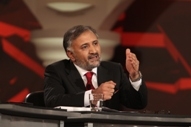
MIRWAIS YASINI
Besmi Allah Al Rahman Al Rahim (In the name of God, the most gracious) Thank you very much for having me on The Doha Debates. Well I would like to begin: political phrases cannot be abstractly translated or interpreted. I would like to make a differentiation between the process, the democracy, people of Afghanistan, and the government; the current government is ineffective, there is no doubt. That is a failed government, and we cannot do with this government as it is, since 2001. There is no security, there is corruption, there is no reconciliation, there are no services for the Afghan citizen, and particularly irritating: democracy remains just a slogan. We did not work on the democracy or for the democracy, but we in due course slaughtered the democracy by introducing the false and fraudulent election to the Afghans. So we are establishing a very dirty precedent from the point of democracy for the Afghan future. I would like to say that some part of the government is functioning. The international community should work for those parts which are functioning, but we have to keep a very close eye [on it], because the international community and the Afghan citizen are sailing the same boat... even... it does go beyond our borders to the neighbours, into the region, so it cannot be improved, we cannot afford failure and the failure is there with the current Afghan government.
TIM SEBASTIAN
You say democracy is just a slogan, but it enabled you to take part in presidential elections in a region where there have been precious few elections. You didn't win but you were able to take part, isn't that an achievement? That happened under this President's watch.
MIRWAIS YASINI
Well we are establishing democracy in Afghanistan... a bad start...
TIM SEBASTIAN
And a large number of Afghans feel that things are getting better. The latest poll, BBC, ABC poll says 68 percent of people think it's getting better.
MIRWAIS YASINI
We are hoping to be better, and also hopeful that things will get better, but it does not mean it is going correctly.
TIM SEBASTIAN
Would you have done any better on corruption?
MIRWAIS YASINI
Well I'm sure if I'd been President my first action would have been just to work on corruption, just to stop the corruption.
TIM SEBASTIAN
Easy to say. I wanted to see what you'd do about corruption so I had a look on your website and it says: "In my government the law of the land will be supreme. Brothers and relatives' officials won't be able to sign agreements and get lands. The parliament and judiciary will be independent." Easy to say - how are you going to bring that about? You were short on methods - high on slogans, short on methods.
MIRWAIS YASINI
I would have not let my brothers just practice everything for them, create a monopoly, oil, in just appointing the governors I will not have done and I will not have let my brothers to be in my government more powerful than myself.
TIM SEBASTIAN
One of the big achievements, surely, of President Karzai in his time in office, is that he doesn't have it all his own way, as we've seen in the last couple of weeks he has a parliament that can reject his ministerial appointments. That is also a sign of democracy, that's not a slogan either is it?
MIRWAIS YASINI
Well they have to go for...
TIM SEBASTIAN
Give the man some credit, maybe that's worth fighting for.
MIRWAIS YASINI
Well I mean, lately the government did not interfere in the parliament, we are not discrediting and we have to go...
TIM SEBASTIAN
It's a little more than not interfering with the parliament, it's part of the democratic process we're seeing in action, isn't it?
MIRWAIS YASINI
But there were deals inside the parliament...
TIM SEBASTIAN
There are deals inside every parliament, aren't there?
MIRWAIS YASINI
Sometimes the deals are legal according to democratic rules, but sometimes it does go beyond the limits of democracy.
TIM SEBASTIAN
Yes, but give him some credit, it's a recognisable process, isn't it?
MIRWAIS YASINI
Well for the last election, the government did not interfere in the parliament and in hopefully he will not interfere again in the parliament. And we have to credit the government and some of the ministers for that.
TIM SEBASTIAN
Some things are worth fighting for. Mirwais Yasini, thank you very much indeed. Now let me ask Lawrence Korb to speak against the motion.
Lawrence Korb
Speaking against the motion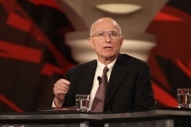
LAWRENCE KORB
Thank you very much Tim, it's a great honour to be here, and it's a great honour to share the platform with these two distinguished legislators. It gives me great hope for the future of Afghanistan, and of course with Ambassador Galbraith who's done so much for our country and for the world, working for the United Nations. I think this government is worth fighting for because it's supported by the people. Tim mentioned the latest poll that was done, not just by BBC but also ABC, an American company, and a German company. And if you look at that poll, the vast majority of people in Afghanistan think the government's on the right track. They're satisfied with the results of the recent election and they trust President Karzai to improve security and economic conditions, and nearly 80 percent have a favourable view of an International Security Assistance Force. It's also better than the alternative; only seven percent of the people in Afghanistan support the Taliban, only four percent want them back. Fifty eight percent think that the Taliban is the great threat to the future of Afghanistan, and 70 percent are very glad that the international force got them out of power. Remember when we talk about government it's not just Karzai. You mentioned earlier that you have a parliament, and I think it's a great step forward that the parliament turned down 17 of the 24 cabinet appointees that President Karzai set up. You also have - as the beginning of a civil society - you've got a free press. Does it have a lot of problems? It does. But a lot of the problems are caused by - and I'll speak primarily for the United States - we went in without thinking about what the long-term goal was going to be. We partnered with the warlords and then of course we left them in power. President Karzai had to deal with them. I'm very confident that with the increased troops, not only from the United States, but with the International Security Assistance Force, we can get the security situation under control. I think then that you'll begin to see the government improve. Final comment: remember that not every government is perfect. If you look at the Freedom House index you will see that they rank democracies. One of the countries they rank high as a democracy is the Philippines; they also ranked them very high when it comes to corruption. Thank you.
TIM SEBASTIAN
Lawrence Korb, thank you very much indeed. We always hear that America goes to war to protect its values abroad, to fight for its values. I'm wondering what values are embodied by a government that allows millions of peoples' human rights to be violated, and is seemingly indifferent to that fact. What values are you protecting there?
LAWRENCE KORB
The United States obviously wants to uphold its values, but you can go back to the Second World War - we had to partner with the Soviet Union to defeat a greater evil in Nazi Germany. And here I think we're partnering with this government...
TIM SEBASTIAN
That was hardly a fledgling government was it? The Soviet Union had been around for a long time.
LAWRENCE KORB
It was not, but you're talking about our values that we uphold, but basically when you have to do things it's a complicated issue.
TIM SEBASTIAN
It's a complicated issue, but if you're fighting for this government, what's the message to the rest of the world? That you'll support any old human rights abuser, as long as it's your human rights abuser?
LAWRENCE KORB
The message is that this government has to clean up its act because is doesn't have a blank cheque, and that's why I'm very happy that President Obama, when he had the troop increase, also talked about a deadline to begin getting out, and basically saying: "If you don't shape up then we're going to have to reconsider".
TIM SEBASTIAN
But it starts to sound a little bit lame doesn't it after a while - you keep on repeating that the narcotics trade keeps on flourishing, corruption, no sign that the judiciary or the police are seeing any improvements there whatsoever. How long are you going to go on? You say it's not a blank cheque.
LAWRENCE KORB
I think we've finally given it the attention that it deserves. The Bush administration was guilty of a dereliction of duty when it came to Afghanistan, not only not sending enough troops, but not providing the aid that they promised.
TIM SEBASTIAN
Isn't the danger though that continuing to fight for this government becomes counterproductive, you stir up extremists, you get new recruits to Al-Qaeda... your drones kill a lot of civilians don't they, in Afghanistan?LAWRENCE KORB
I think if you ask the Afghan people, they're very much in favour of what the United States and its partners are doing.
TIM SEBASTIAN
In one of the opinion polls? There are others, aren't there?
LAWRENCE KORB
Well there are others, but I think the basic thing about this opinion poll is how they think the government is on the right track, improved by thirty percentage points over the last year.
TIM SEBASTIAN
All right, Lawrence Korb, thank you very much indeed. Well we're going to throw this issue now open to the audience. The motion: ‘This House believes this Afghan government is not worth fighting for'. We're going to take some questions. The gentleman in the front row - you sir. Can we get a microphone to you, and if you could tell us where you're from please?
Audience questions
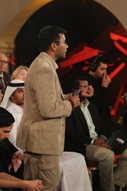 AUDIENCE (M)
AUDIENCE (M)
Thank you, I'm from Bangladesh, and my question is to the two of you who are against the motion. Why doesn't the Afghan government speak against the drone attacks? You say the government is very popular with the people, but they do not really like the surge that you just talked about. President Obama just agreed to the surge, there's going to be more troops coming into Afghanistan. A few days ago there was a water tank that was blown up while people were taking drinking water from it. People are dying and they don't really like the American troops there. President Karzai was a good friend of Bush and he still acts like he's working on Bush's policies.
TIM SEBASTIAN
Okay, Shukria Barakzai, would you like to take that?
SHUKRIA BARAKZAI
Thank you. I think it is not the point what President Karzai is like or what President Bush thought about Afghanistan. This is about increasing troop numbers, which I believe, personally, and the majority in Afghanistan... it means we are supporting war, we are not going for peace. At the end of each war there is a time for peace and negotiation, and for sure we have to have a red line for our own constitution. None of the talks and peace negotiations should cross the Afghan constitution. In the meantime, right now, there's no need for us to think: what is Karzai thinking or what is Obama thinking - now's the time that both governments, both states should think [about] what's shared between their successes and their failures, both are shared.
TIM SEBASTIAN
Okay, do you want to come back on that?
AUDIENCE (M)
Why aren't you, a member of parliament, why aren't you asking why there isn't more resistance against foreign troops? Why don't you speak up and say we don't want foreign troops coming up, we are against the surge? That voice is not coming out.
SHUKRIA BARAKZAI
For sure, Afghanistan never wanted to be host to foreign troops for long, any troops from any country, this is the history of Afghanistan, this is our nature. But right now, for the time being we are like a little baby, until we can stand on our own feet we need them unfortunately. Like it or not.
TIM SEBASTIAN
Okay, Lawrence Korb?
SHUKRIA BARAKZAI
Let me say another thing. We are against any other actions, starting with civilian casualties, searching houses and other things which are against our tradition, custom, constitution and all international conventions in Afghanistan, which is most of the time what the international troops are doing.
TIM SEBASTIAN
Okay. Lawrence Korb?
LAWRENCE KORB
I think it's important to keep in mind the United States does not intend to be an occupying colonial power, we want to get out of there. A lot of people did not believe we would ever leave Iraq: we withdrew from the cities on the 30th June. We're going to be out completely by the end of 2011 because the Iraqi government asked us to do that.
TIM SEBASTIAN
Okay, I'm going to take a question from the gentleman in the fourth row there. You, sir.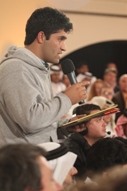 AUDIENCE (M)
AUDIENCE (M)
Good evening ladies and gentlemen. I'm from Afghanistan and my question goes to the proposition side of the motion. My first question is to Mr. Galbraith.
TIM SEBASTIAN
You'll only get one question I'm afraid, there are a lot of people.
AUDIENCE (M)
Okay, sure, these are short questions. How can I trust what you say? You supported the process, you supported the government, you were standing, you I mean the organisation, were standing with Hamid Karzai supporting him throughout the process. But now, at the end, you're leaving him alone, you supported the government... and tell me what's the UN doing about the civilian causalities there? They're not even thinking of anything there.
PETER GALBRAITH
Thank you for that question. The United Nations engaged in its own severe dereliction of duty in Afghanistan. It was charged by the Security Council to support the Afghan electoral institutions and the holding of honest elections. And it simply gave - the head of the mission simply gave - a blank cheque to the Afghan electoral institutions. The independent Election Commission was the body that carried out the fraud. At every instance where fraud took place, its staff was in one way or another complicit. Now why should you trust me? Well I can tell you that I disagreed with the head of the mission, I said that the UN had a responsibility to promote honest elections, at various stages in this process I tried to take steps to have honest elections including to close polling centres where there were going to be no voters - the so called ‘ghost' polling centres - and to get the Election Commission to stay with its procedures. In the end there were protests against me from the Afghan government and I was removed and since I was removed I've been speaking out about the problem. 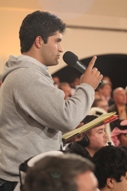 AUDIENCE (M)
AUDIENCE (M)
From what I have heard you were not removed, you said yourself that you resigned. That you had some problems.
PETER GALBRAITH
That's not true. Let me put an end to that, I did not resign, I was fired for having raised the issue of fraud in UN-funded and UN-supported elections. I find that to be quite extraordinary.
TIM SEBASTIAN (to questioner)
Okay, let me ask you: where are you on the issue of the Afghan government? Is it worth fighting for from your point of view?
AUDIENCE (M)
[The] Afghan government could do better, but I cannot blame the Afghan government, I cannot blame Karzai. I mean Karzai came to a ruin, there was no country, there was no government. I think I appreciate his efforts in bringing the country together, and I have one comment to Mr. Yasini.
TIM SEBASTIAN
He's got one for you as well.
AUDIENCE (M)
Okay. Just one question: you were part of the government I believe in 2005 and 2004, you were one of the high-ranking members in the Ministry of Interior, you were dealing with drug trafficking and these kinds of issues. And I remember that drug trafficking was dramatically increased in those times. What have you done about corruption? What have you done about trafficking? And why are you leaving the government if you want to fight it?
TIM SEBASTIAN
I think that's enough questions, thank you.
MIRWAIS YASINI
Thank you very much. I will try to answer your first question first. First of all the international community is equally responsible in the fraudulent election from the fraud point of view. Only 120 European monitors are not enough for the whole of Afghanistan, number one. Number two: they knew, we had information, we told them that there will be massive fraud in the election, but nobody bothered then or afterwards when we, the Afghans, started complaining about election irregularity. It's very obvious: there were 7,000 complaints in the Election Complaints Commission. Of those 7,000, 2,500 were strong complaints. Of those, there was proof that we presented to the international community and myself too, the head of that complaint commission, that thousands of our votes were stolen. So that was an earlier response to your first question.
TIM SEBASTIAN
Okay, do you want to come to the second question about what you did about drug trafficking?
MIRWAIS YASINI
The second question: first of all I was not an official of the Interior Ministry. I was in charge of the Controlled Narcotics Policy Division. And at that time, if you go back, you're very right with the dates, but you misunderstand a little bit: the opiates in that era were down... a 25 percent decrease was met when I was Director of Controlled Narcotics in Afghanistan.
TIM SEBASTIAN
So you're saying you did a good job?
AUDIENCE (M)
Why didn't you stay in the government if you were doing a good job, because we needed you in the country? Why didn't you stay in the government? You went to the parliament and you started an opposition against the government.
MIRWAIS YASINI
I did want to go to the parliament to be the true voice of the people, and I achieved it, I decided, and the people encouraged me, to go and leave the government in that shape which it was going, and I couldn't have that responsibility of how the government has been run since 2004, 2005 up to now.
TIM SEBASTIAN
Okay, I'm going to take another question from the gentleman in the third row. You, sir. 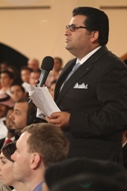 AUDIENCE (M)
AUDIENCE (M)
Good evening, I'm the ambassador of the Islamic Republic of Afghanistan here in Doha. My question actually goes to Mr. Galbraith, who was recently removed, or as he indicated, fired, from the UN, and also Mr. Yasini, a presidential candidate that only won, let me say, won 0.9 percent of the votes in the last democratically elected election.
TIM SEBASTIAN
Okay can we have a question please?
AUDIENCE (M)
Now the alternative: what sort of alternatives would you provide us, instead of this current government? I have not heard a viable alternative, or solution.
TIM SEBASTIAN
Okay, Peter Galbraith.
PETER GALBRAITH
Mr. Ambassador I think that you've raised a very good point. Obviously if you have a government that's in office by fraud, that government is not going to have the support of at least the part of the population that did not vote for it, which was probably at least fifty percent, perhaps closer to sixty percent. So what do you do now? One possibility would of course be to rerun the elections, that would require a genuinely independent election commission, and it's hard to see how that might take place. But there is an alternative in Afghanistan of having a Loya Jirga, which might in the end be able to produce some power sharing arrangements. Part of the problem in Afghanistan is you have one of the world's most diverse countries, both ethnically and geographically, and yet one of the world's most centralised political systems. It doesn't work. So as an alternative, and this is proposed by Afghans, and it's a decision I'm going to emphasise, for Afghans, not foreigners to make. But one alternative would be to have power sharing, as exists in many countries, with a prime minister and cabinet chosen by the parliament, and with elected local government at the provincial level, with real powers, legislative and budgetary powers.
TIM SEBASTIAN
Would you like to reflect on that? He's telling you that your government isn't worth fighting, for Mr. Ambassador.
AUDIENCE (M)
Well we have to understand the conceptual, contextual constraints right now in Afghanistan. Holding a Loya Jirga, I think at this moment is null and void, realising that almost six million people went to the voting booths and voted. So this is your perspective and that's your opinion... and the stats you've given me... I can reject those stats.
PETER GALBRAITH
Six million people didn't vote. At least a million, probably more, of those votes were fraudulent.
TIM SEBASTIAN
Okay, I'm going to go back to... there's a lady's hand right up there. 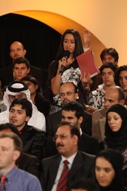 AUDIENCE (F)
AUDIENCE (F)
I'm originally from Afghanistan, and like a lot of people I think the only hope for my country is democracy. Considering Western democracies which took centuries to establish themselves, shouldn't we give Afghanistan more than five years to establish its democracy?
TIM SEBASTIAN
Mirwais Yasini.
MIRWAIS YASINI
Well thank you very much for your question. First of all, age is not needed to establish democracy in Afghanistan, but your concern and my concern and the concern of the Afghans is that we are just establishing a good democracy, the foundation has to be solid, the foundation must not be fraudulent. And I completely agree that we have to give it time, but when we began and when we move in the beginning steps it has to be very transparent and clean. And I do agree with you, I would like just to respond to the Excellency, our Ambassador here in Qatar. First of all, if there was an alternative, and if we would have been elected and our team were elected, we would not have credited a mayor who was arrested and he was imprisoned by the court, and he would just undermine the court decision and the president is just saying: "Well this is negligence". Where is the judiciary? Where are the rules? In the due course of history we haven't noticed that the president moves against the judiciary.
TIM SEBASTIAN
Okay, Shukria Barakzai.
SHUKRIA BARAKZAI
I agree with you there, democracy is not a product, it's always a process and this process needs decades, generations and we are...
TIM SEBASTIAN
Why does it have to have decades and generations?
SHUKRIA BARAKZAI
How long did it take democracy for your country to be established?
TIM SEBASTIAN
Well the world was in a very different state then, the world is much more connected now.
SHUKRIA BARAKZAI
It's the same, it's the same. How long [did it take the] United States to establish democracy, to have democracy, to have a state?
PETER GALBRAITH
I think you're selling the Afghan people short. The Afghan people are fully capable of democracy, the issue in this election was not about whether Afghans could have democracy, it was whether the votes could be counted honestly. And that's very simple.
SHUKRIA BARAKZAI
I'm really sorry, you're sticking with the election, but when I'm talking about democracy it means equal rights, freedom of expression or free press, it means rule of law, the implementation of human rights, equal access for justice, delivering social services for the people, having, let's say, freedom for political parties. These are all values we survived and power sharing, a checks and balance system, it's all democracy - not only the election that you can monitor for a few months in Afghanistan. I'm sorry for your job that you lost, but it's not the fault of Afghans, it is the fault of your institution.
TIM SEBASTIAN
Okay. Lawrence Korb.
LAWRENCE KORB
We tend to confuse too often elections with democracy. They are not. It's civil society that you have to build and that's the key thing. Even if you had a perfect election, unless you had built civil society, free press, independent judiciary, independent parliament, it's not going to work. And I think if you take a look, not only did they turn down several of the ministers that Karzai proposed, but he appointed seven really good ones. If you take a look at things like finance, education, agriculture - these are really good people. So I think you're moving in the right direction.
TIM SEBASTIAN
What, that they got turned down? You're applauding the fact they got turned down, good people got removed?
LAWRENCE KORB
Well again I think that's a step in the right direction, that it's not all, you know... these people that are supposedly cronies or whatever it might be.
TIM SEBASTIAN
Okay, gentleman in the fifth row.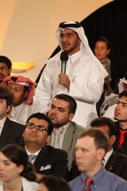 AUDIENCE (M)
AUDIENCE (M)
Hello, I'm Qatari. I would ask what makes the Afghan government a legal government? Since the Taliban didn't take a part in it and there was fraud in the election?
TIM SEBASTIAN
I'm sorry, could you repeat? What makes the Afghan government what?
AUDIENCE (M)
A legal government, since the Taliban didn't take a part in it and there was fraud in the election.
TIM SEBASTIAN
Mirwais Yasini.
MIRWAIS YASINI
Well the Taliban did not get a part in it, because they could not get a part in it, number one, I have to admit that. We were looking for ages, and still there is a slogan of reconciliation, nobody bothered about reconciliation with the Taliban, we don't have any institution, and that's what we are trying to say: that this government needs to be improved in order to get to reconciliation with the Taliban.
TIM SEBASTIAN
Shukria Barakzai, a legal government is it?
SHUKRIA BARAKZAI
I do believe that the Taliban are also Afghan, they are part of the country and they have equal rights according to the constitution that I have. It also depends on them. I think one question is always in my mind, they are not accepting the old legitimate procedure, which started from 2001 to today - it doesn't mean that they didn't participate in the election. I will tell you, there is a guy who is a former Taliban governor, he was also standing for the presidential election and he also got a good number of the votes. And also we have in our system some Taliban who are there elected by the people, they are the reality and they are the truth. But it does not mean because legitimacy is not coming from their address they are as a civilian, they are as a people, they can join all democratic procedures, but not with the violence, not with the crime, not with the suicide attacks.
AUDIENCE (M)
What about the fraud in the election?
SHUKRIA BARAKZAI
Fraud? Do you have any examples of any good election? Let me tell you, I need maybe two minutes?
TIM SEBASTIAN
Two minutes is too long. A brief answer.
SHUKRIA BARAKZAI
Do you know under what circumstances we went to the polling station? Exactly 72 hours before the election, the ISAF and NATO ordered the stopping of war. These were the circumstances under which we went to the polling station - the country and the city were under attack... you know when I'm saying attack, under bomb attack, under suicide attack.
TIM SEBASTIAN
And that somehow excuses fraud? Does it? Shukria Barakzai, that excuses fraud?
SHUKRIA BARAKZAI
There's no excuse any time for any fraud, what I believe election is not a governmental procedure, it's always a national process which the nation should stand for... they should practice, they should...
TIM SEBASTIAN
Okay, I want to bring the questioner back. Are you happy with what you heard?
AUDIENCE (M)
Yes.
TIM SEBASTIAN
Amazing.
SHUKRIA BARAKZAI
Thank you.
TIM SEBASTIAN
Gentleman in the third row.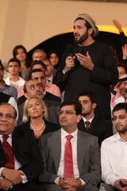 AUDIENCE (M)
AUDIENCE (M)
I'm from Afghanistan. You talked about values and I would like to talk about values. First of all democracy is not a natural order of life, so what about dying for honesty, how about that value? How about dying for legitimacy? What about dying for legitimacy? To win peace you must wage peace, it's a plagiarism, it's not my quote, I forgot who said it. But you seem to have a schizophrenic political stance: from one point you are saying that the country is in such a mess we need more troops.
TIM SEBASTIAN
Who are you addressing that to?
AUDIENCE (M)
The camp that is for more bloodshed. You are saying the country is in such a mess we need more blood because you've done a good job. I am surprised.
TIM SEBASTIAN
Lawrence Korb, do you want to take that?
AUDIENCE (M)
And when the going gets tough I'm sure that those with double passports will flee Afghanistan like past prime ministers and past ministers... they left Afghanistan. Where is the former Minister of Finance?
TIM SEBASTIAN
Okay, you've had your question. Lawrence Korb.
LAWRENCE KORB
I think a lot of American and coalition forces are dying, 520 died last year, 15 have already died in 2010, and they're dying to give the Afghans the opportunity to choose their own destiny. We have no interesting in running Afghanistan, being like the Soviets or like the British when they came. We're interested in helping the Afghan people make their own choices and they have a limited amount of time and they're going to have to basically... their future is in their hands, after a couple of years we will have done all that we can. Now we also have a national security interest in it, we do not want to see, and it's not just the United States, remember there are 45 other countries there that are concerned that if the Taliban should come back or should there be chaos there, it could spread all throughout the region. We haven't mentioned it but the whole question of what happens in Pakistan if Afghanistan collapses.
TIM SEBASTIAN
So Lawrence Korb, you're in there for your own security interests - you're not there for the Afghan people, are you? That's the reason you went in, that's the reason you stayed in.
LAWRENCE KORB
There's no doubt about it, the fact is that no country puts its military in harm's way without its national interest being involved. But there's no reason why our national interest cannot be congruent with the Afghan national interest, because in the long term what will be good...
TIM SEBASTIAN
But as an after thought, long after your own security concerns have been looked after.
LAWRENCE KORB
No doubt about it.
TIM SEBASTIAN
So you're in there for yourselves?
LAWRENCE KORB
We are in there, but the two can work together, because we are not basically going to stay until the outcome becomes one that we decide, it's going to be up to the Afghan people. Just like it was in Iraq, the Iraqis kicked us out, and we're leaving. A lot of people thought that would never happen.
PETER GALBRAITH
The Taliban is not going to come back, let's be clear. The Taliban is an entirely Pashtun movement - Afghanistan is only 45 percent Pashtun. It has no support among the other communities: the Tajiks, the Hazaras, the Uzbeks, and so as long as there's some support for the non-Taliban elements, which also include many Pashtuns, they are not going to come back. The Taliban in Pakistan is also basically a Pashtun movement, the Pashtuns are at most 15 percent of Pakistan, they're not going to take over Pakistan. Which incidentally is a much more stable country, with institutions, than a lot of people are giving it credit for. So let's have some realistic perspective on what's at stake here. To address the issue of the fraud, this was not a matter of elections being held in circumstances of violence, that isn't what caused the fraud, the fraud was caused by election officials conspiring with local officials to never open polling places and simply to report results from fictitious locations and to do it on a massive scale. And by so doing that they disenfranchised every Afghan who cast an honest voice.
TIM SEBASTIAN
Okay, Mirwais Yasini.
MIRWAIS YASINI
Well I would like to have first of all a point with my co-speaker and then a point with Lawrence.
TIM SEBASTIAN
Can we make them brief, we have a lot of questions.
MIRWAIS YASINI
Okay I'll do my best. First of all [about the]Taliban coming... I mean do not rule out this chance, don't jump out of the plane without a parachute. If the foreign forces are not there, if the Americans are not there, the Taliban will make it very easy to come back ... or to attack Kabul. So don't underestimate the enemy, number one.
TIM SEBASTIAN
So the government is worth fighting for then?
MIRWAIS YASINI
Well the process is worth fighting for, the government itself is a problem to fight for.
TIM SEBASTIAN
The process is embodied in the government isn't it?
MIRWAIS YASINI
Well whatever it is, the ball goes back to the courtyard of the United States and our Western allies there, because my second point was, they don't support the drug lords, they don't support the corruption, they don't support the bad governors, please do support the democracy and justice in Afghanistan.
TIM SEBASTIAN
Okay, Lawrence Korb, do you want to answer that point?
LAWRENCE KORB
Well I think we are because President Obama has made it very clear to President Karzai, if he continues to do the things that you're talking about the international community is not going to continue to help him. Don't forget that a lot of the problems that you're talking about were caused by the fact that we went in there, created a vacuum and then walked away. And that's part of the problem that you have - in my view it was criminal for what the United States did by going in and then ignoring the place. President Bush promised the Marshall Plan to the people in Afghanistan and then never followed up. Ambassador Galbraith was right, the Taliban might be 15 percent of the population but the people will go with them if they're afraid like they did back in the nineties.
MIRWAIS YASINI
We are just waiting [for] the result on the ground.
TIM SEBASTIAN
Okay, Shukria Barakzai.
SHUKRIA BARAKZAI
I was one of the optimistic Afghans when the United States came after the Taliban because I suffered. I'm 38 and out of 38 years of my life thirty years, three decades, I couldn't even imagine there was life after nine o'clock or sometimes ten o'clock or sometimes four o'clock in the evening in the city. Because there was a different government, different rules, and lots of catastrophe and lots of tragic stories. But when they came they said they will provide and they will support democracy and there will be Marshall Plan. What was the Marshall Plan? They jumped to Iraq, they left Afghanistan because they believed the chapter was closed, this is final... but today, again they come back, and again they are paying triple. Why? Because they didn't...
TIM SEBASTIAN
Just finish please.
SHUKRIA BARAKZAI
They didn't invest in the infrastructure in Afghanistan, they didn't listen to the silent majority in Afghanistan, they support again the wrong people for the wrong process.
TIM SEBASTIAN
Okay, I'm going to take a question from the lady in the second row.
AUDIENCE (F)
I just want to...
TIM SEBASTIAN
Where are you from please?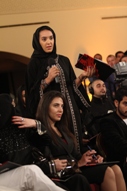 AUDIENCE (F)
AUDIENCE (F)
Qatar. I just want to go back to something you said earlier. You said that elections are a national process and that people must practice, well if they keep on practising when's the real thing going to happen?
SHUKRIA BARAKZAI
Sorry?
TIM SEBASTIAN
If they keep on practicing elections, when is the real thing going to happen?
SHUKRIA BARAKZAI
The real thing - they will have the real leader.
TIM SEBASTIAN
I think they had the real thing.
TIM SEBASTIAN
Gentleman in the front row. You sir.
AUDIENCE (M)
Thank you, I'm from Pakistan and just to help everybody to come to a conclusion I think we've been talking about bribery and corruption and misappropriation of funds.
TIM SEBASTIAN
Can we have a question instead of help?
AUDIENCE (M)
The question is a difficult one, can you quote some numbers in the last seven years - how much funds have been misappropriated, how much funds were spent actually on the government, the country and the people and how much funds have been misappropriated?
MIRWAIS YASINI
Well, if I tell you ‘yes' I won't be telling you the truth, but there was so far 23 billion dollars spent in Afghanistan, most of that money was spent by the international donor itself. Like the highway between Kabul-Kandahar, Kandahar-Herat, built by the Japanese - the money was given by the Americans. But I can tell you one thing: that our ministry, this year, will not be able to spend more than 40 percent of their budget, so you can judge our efficiency, number one. Number two, the corruption cannot be valued - it is very, very difficult to keep track of the corruption.
TIM SEBASTIAN
I just want to go back to the question for a moment. Do you think that level of corruption should rule out foreign troops fighting for this Afghan government?
AUDIENCE (M)
Well definitely I think this level of corruption means, as he's rightly saying, you need the change in process... but I don't think that with this level of corruption that's the right government to fight for. You definitely need a change in government.
MIRWAIS YASINI
But nobody can afford the failure as I said earlier - either you do or you die, the terrorism cannot be contained even in one country or in that area, it will go beyond those borders.
TIM SEBASTIAN
Shukria Barakzai.
SHUKRIA BARAKZAI
Yes, the Afghan government received 30 percent from international organisations, such as the United Nations and others, they got 70 percent from all eight for Afghanistan. But the government of Afghanistan is responsible, the old corruption is about 30 percent, nobody is talking about 70 percent where they spend it, how they spend it. When it comes to the capacity, I think capacity building is impossible to build overnight, particularly with the lack of a system, because what the donor wants... they have their own priorities. But we, as a nation, as a country, we have our own priority, our own priority is never important for them, for them this modern issue and lip service is the top priority which is what they want to deliver, always for their own people, particularly at the time of the election. But the international....
TIM SEBASTIAN
All right, I'm going to take another question, thank you very much. The gentleman up there.
AUDIENCE (M)
My question is for Ms. Shukria....
TIM SEBASTIAN
Where are you from?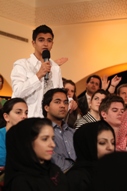 AUDIENCE (M)
AUDIENCE (M)
I am from Syria. You support troops in Afghanistan, but unfortunately we are losing soldiers - shouldn't we stop the firing by taking out the troops and live in peace?
TIM SEBASTIAN
Lawrence Korb I'm going to ask you to do that, but in a sense we've already covered the subject.
LAWRENCE KORB
I think we would all like that, but right now, what happens is, when the Taliban takes over an area they brutalise the people, and we do not have enough troops to go in there and provide that security, I think, when we do that. Plus in addition to sending more troops we're trying to increase the training for the Afghan security forces so they can provide that security.
SHUKRIA BARAKZAI
Only one second. I will never support foreign troops to come in Afghanistan. I want our own troops, national army, national police to be on the front line.
TIM SEBASTIAN
Okay, the gentleman in the front row.
AUDIENCE (M)
I'm from Pakistan. My basic question is to the panel for the motion. Don't you believe that the political system is the one that needs to be restructured? Rather than blaming the ills of Afghanistan on the present government, it should be given time rather than blaming them. Isn't it that the political system needs to be changed?
TIM SEBASTIAN
Peter Galbraith.
PETER GALBRAITH
Well yes. I think that this is something that the Afghans need to consider. Again it is a very centralised system, a Napoleonic one, in a country that is itself very diverse. And so the government actually doesn't exercise authority over most of the country, doesn't exercise authority in the Tajik areas in the north because they don't consider Karzai legitimate. It doesn't exercise authority in the Pashtun areas in the south because in the countryside the Taliban basically run it and the Taliban in fact actually control much of Kandahar. So it is a system that is nominally very centralised, but in fact is very ineffective, so I do think that's one of the things that has to be looked at. The other thing that clearly needs to be reformed is the electoral process. When the president appoints the head of the election commission and its members and then they have a blank cheque to act, not as independent election commission, but as partisan agents, of course you're going to get this kind of result.
TIM SEBASTIAN
Shukria Barakzai you've been sighing in disagreement and then I'll come to Mirwais.
SHUKRIA BARAKZAI
I totally disagree. No part of the country is not belonging to one ethnic group, even central Afghanistan... [in] our country, every single ethnic group is living as a sister and brother with each other. So if you want to divide an ethnically based country it's impossible. If you want to divide the country by south, north, east, west - it's impossible. Mr. Galbraith is raising the issue of sharing power - power sharing exists already, the president nominates the minister, we reject it. He's speaking about the central government as powerful: it's not.
TIM SEBASTIAN
Mirwais Yasini.
MIRWAIS YASINI
Well I do have to agree with Shukria on this, there is only one Afghan nation and we do agree... yes, we are one nation which is the Afghan nation, number one. And regarding changing the system. We didn't try the current system, let's try for 10, 15 more years, the presidential system. If it doesn't work then we will switch to a parliamentary [system], but we didn't try the current one. Let's transparently try this one and if it's not working, well then we will think about going straight to the other one.
SHUKRIA BARAKZAI
As long as there's no strong political party how can we think about having a different political system?
TIM SEBASTIAN
Okay, the lady in the second row.AUDIENCE (F)
I'm from Sudan and my question is for the proposition. The alternatives that you proposed were re-running elections and power sharing, both of which need voting and which need also people to vote. So if the presidential elections, as you said, were unfair and were filled with corruption, what makes you think that these alternatives will be any better?
TIM SEBASTIAN
Peter Galbraith, this was your idea.
PETER GALBRAITH
Look, you're clearly going to have to have reform of the electoral system. You need to have an independent election commission that's not going to be the service...
TIM SEBASTIAN
Who should reform it?
PETER GALBRAITH
Well in the end this is going to be the Afghan parliament and legislative process that has to reform it, but if it's not reformed then the international community shouldn't pay for the elections. These elections were three...
AUDIENCE (F)
Isn't that what happened with the United Nations supporting the past elections?
PETER GALBRAITH
Well the United Nations raised 300 million dollars from Western taxpayers to pay for this election, and those people thought they were paying for an honest election, not a fraudulent one. There's going to be an election in May for parliament with the same commission in charge. The election cannot be held unless the international community pays and I think it would be absurd to pay unless you thought it was going to be an honest election. There's another point about these elections though that's so critical: this fraud has made the military mission much more difficult for the foreign troops. Since they don't have a credible local partner they cannot accomplish their goals, as a result of the election more money is being spent than would otherwise be spent, and people actually are dying because of it. So this is not just an Afghan problem, it is a problem that affects the international community and so it does have a right to demand, as a condition of its continued presence, reform.
TIM SEBASTIAN (to questioner)
Did you want to come back on that?
AUDIENCE (F)
I just want to ask, do you not think that anything can be done to improve the current government instead of trying to disregard it, because we know that it's so difficult to ensure fair and just elections?
PETER GALBRAITH
Look, President Karzai's been in office for eight years, it is truly hope over all reasonable experience to expect that in the next five years it's somehow going to be better than it's been in the last eight years, especially when the security situation is worse, and again where he's now in office and so many people see him as illegitimate.
LAWRENCE KORB
The people may be like you, but the Afghan people don't see him as illegitimate.
PETER GALBRAITH
But the Afghan people didn't vote for him.
LAWRENCE KORB
In polls they say...
PETER GALBRAITH
I'm sorry but an election is a poll, Lawrence.
LAWRENCE KORB
But an election is more than a poll. If you were afraid to vote because the Taliban might kill you, that makes it very difficult to vote and if you take a look at...
PETER GALBRAITH
That wasn't the problem. The problem was the people manufacturing votes.
LAWRENCE KORB
That was part of the problem because in the areas that they control, which normally would have supported Karzai, the people couldn't get to the polls and they were afraid to go there.
PETER GALBRAITH
They weren't allowed, the corrupt officials didn't even permit the polling places to exist, they just manufactured the votes.
LAWRENCE KORB
In certain areas they did, but not in all of them.
PETER GALBRAITH
Massively... millions of them.
LAWRENCE KORB
No they didn't.
SHUKRIA BARAKZAI
Let me remind Mr. Galbraith, as I mentioned at the beginning that this is not the first time that Karzai has been elected, this is the third time - not once - this is the third time. Before, during the transitional term; the second; first presidential election; and the third was that time.
PETER GALBRAITH
The first election was a UN-run election, and was reasonably fair. This election was run by the pro-Karzai election commission and was massively fraudulent, and there was every reason to expect that the Afghan people had become disillusioned with Karzai. We estimate based on what the election complaints commission staff tell me, that Karzai's real vote was about 41 percent... I'm told about 35 percent.
SHUKRIA BARAKZAI
Talking about the election commission, I agree with you, I don't like them too. But when I'm talking about the people that went to the polling station...
TIM SEBASTIAN
Shukria, what's the point in having another election when they're in charge, if they're already discredited, why have another election when they're in charge?
SHUKRIA BARAKZAI
People are going to the polling station - this is the people of Afghanistan. The election commission, if they were pro-Karzai why did they announce the second round election? Because you dropped millions of votes, 30 percent of Karzai votes you say, it's about the fraud, and 20 percent Dr. Abdullah, you say it's a fraudulent vote. Even you add Ramazan Bashardost, there's also 20 percent, the vote is just fraud, but there's a question, it's not legitimate to say, from your address, specifically because if Afghans say it's illegitimate - it's acceptable for me, but for one person who is retired, who is not Afghan, how you can talk? You should be responsible from your own work time and your office after you raised the issue why you didn't make a mechanism to be a fair election because you were responsible, not us.
TIM SEBASTIAN
Shukria Barakzai let him answer that, ok, let him answer.
PETER GALBRAITH
Let me be clear, it was my responsibility to be...
SHUKRIA BARAKZAI
As an institution...
TIM SEBASTIAN
Can you let him speak please?
PETER GALBRAITH
It was the UN's responsibility, and my responsibility, to support honest elections, and since it was obvious that these elections were not going to be honest, the UN should have done more. I tried within the system as a good diplomat - I didn't go public, it was internal - there were profound disagreements, ultimately because of this I was sacked. But so arguably, perhaps I should have resigned, perhaps I should have gone public before the elections, perhaps I didn't do enough. And so maybe you're right to blame me. But there was, absolutely, a systematic failure on the part of the United Nations, but in the end the fraud that was committed wasn't committed by the United Nations, it was committed by the Afghan electoral institutions. And while you support President Karzai, there are many Afghans who did not support President Karzai, who do not see him as legitimate. Those people were disenfranchised by the result and those people today are not supporting the government because they don't feel it represents them because they didn't feel there was a fair election.
SHUKRIA BARAKZAI
Which group are you talking about? Can you identify them for me? Because we have one group which are not accepting the legitimacy of the Afghan government, if you are presenting Taliban, most welcome because they are the only...
PETER GALBRAITH
In fact I'm talking about some of the anti-Taliban groups.
SHUKRIA BARAKZAI
Like what? Like Dr Abdullah?
PETER GALBRAITH
Like many of the Tajik community - 25 percent of the country.
SHUKRIA BARAKZAI
I'm sorry, I'm sorry, please don't divide us with the name of ethnic [groups], we are one nation.
TIM SEBASTIAN
All right, I wonder if there's anyone in the audience from the West who thinks that this Afghan government is worth fighting for or doesn't, or who has a strong opinion? Gentleman in the third row, you're from where?
AUDIENCE (M)
I'm from Britain. My question was, and I think you understand my point of view when I ask Lawrence Korb, you seem to demonstrate a lot of faith in the polls, half your talk you were quoting statistics. I'd like to know why, when we don't know how many people voted for Karzai, that we can believe the BBC and ABC when they say 68 percent of Afghans can think this or that. I'd also like to remind you that the BBC had to apologise when it was fiddling television votes inside the UK, so I think American and British broadcasters might have a vested interest when they come to reporting statistics in Afghanistan.
TIM SEBASTIAN
That's very suspicious of you. Lawrence Korb.
LAWRENCE KORB
It's interesting that you mention that because if you look at the polls a year ago they were much more pessimistic about Karzai and his ability to solve things, or felt that the country was on the right track. So people who looked at that a year ago didn't raise the thing that you have. I'm not going to argue these polls are perfect, but this is not just, it's a German, American and BBC poll. So if you take a look at the three different viewpoints on what Afghanistan should be and the direction it's going, I do have a confidence, and if you listen to the comments here tonight I think you'll see that people are saying many of those same things. And I made the point before, you can't confuse elections with democracy... elections don't necessarily lead... you need to have a civil society, you need the fact that the parliament... we keep talking about the government... the government is not just Karzai, the government is several branches, and the fact that they were able to stand up to him I think is an indication that we're moving in the right direction. And the other thing is if you go back and you take a look at the polls when we came in, got rid of the Taliban, made all these promises, we were popular. But then as security deteriorated, so did the polls. I don't think it's any accident that the United States and its partners have stepped up, that you're beginning to see the polls change.
TIM SEBASTIAN
Okay, the gentleman in the fifth row, you sir. AUDIENCE (M)
I'm from the US. My question is what exactly are the points of corruption, and also, being from the US, when George Bush ran there were questions about his nomination, so that wasn't considered a non-corrupt election. But also, when you commit to something, I mean like when the US committed to going into Afghanistan...you create a situation, so why would you just pull out just because you think that the election was corrupt, and why can't you pinpoint the points of corruption? It's one thing to speculate, but you should be able to troubleshoot the problem.
TIM SEBASTIAN
So your view is that the troops should stay in, they should stay and fight for this government?
AUDIENCE (M)
Well I'm saying, you know you do it for the innocents, right, you do it for the innocent people, so that's always the agenda.
TIM SEBASTIAN
Thank you for your view. Let's get a view from the front row, lady in the front row here.
AUDIENCE (M)
But my question is why can't you pinpoint the points of corruption?
TIM SEBASTIAN
I think they've been pinpointed during the course of the debate actually. Lady here, can we have a microphone to the front please?AUDIENCE (F)
Good evening, I'm from Qatar, my question is for the panel against the motion, particularly Mr. Lawrence. Sir Lawrence, do you think that the war in Afghanistan is worth fighting for only from an American point of view? I mean why would the US go to a war unless it's not going to serve its interests, right? There are so many corrupt countries in Africa and Asia and yet the US wouldn't go there. Also do you see the aftermath of Afghanistan and what happened, do you see any similarities between Vietnam syndrome and Afghanistan?
LAWRENCE KORB
There's no doubt about the fact that the United States wouldn't neglect its national interest. You're quite right, there are a lot of problems around the world that the United States can't solve. But remember this is where the attacks of September 11th originated. We, President Bush - and I'll say something nice about him - told the government of Afghanistan, then the Taliban: if you turn over Al-Qaeda we'll leave you alone. It wasn't our idea to go in and transform. Now having done that then you add a moral dimension that the gentleman at the back was talking about when you overthrow a government you just can't walk away and say: "Well now you're on your own, good luck". And you had the Bonn Conference with the international community that set up the constitution that we're talking about. And I would say that President Karzai, despite what Peter said, was accepted by everybody at the Bonn Conference, even the people in the northern part of the country. So it was not forced on them, this was accepted by them. Now, has it had problems? It stayed in office, no doubt about that fact, but I would argue part of the reason he has had the problems in order to stay in power with the deteriorating security situation, [is that] he's had to make what I would call corrupt bargains to stay in there because we, and I'll speak for the United States, did not do our job, because we got distracted by Iraq.
TIM SEBASTIAN
All right, the gentleman in the front row.
AUDIENCE (M)
Good evening I'm an American also. So this is to Mr. Korb and mostly to the panel also. Aren't we getting mired... aren't we missing the point, isn't the whole point, like you said, the security situation? Shouldn't the government be evaluated not so much on its legitimacy - there's many illegitimate governments around the world, there's many corrupt governments around the world. But shouldn't we evaluate the government on its ability to physically take control of the country?
TIM SEBASTIAN
Peter Galbraith.
PETER GALBRAITH
Look that's exactly the point. We don't need to address the issue of whether Mr. Karzai is good or bad, if in fact he is ineffective, is seen as illegitimate and therefore cannot be a reliable partner. And that really is the issue here. Our troops are valuable resources, they are lives, they are resources that could be used elsewhere in support of American national security. If they cannot accomplish their mission in Afghanistan because there isn't a reliable partner, then they shouldn't be there.
TIM SEBASTIAN
I want to let him come back.
AUDIENCE (M)
You raised the point about legitimacy and I think we should take that off the table for the moment, the bickering in Afghanistan's parliament, the problems with its ministers - they're arguing over a country that they don't have control over yet. And if 400,000 troops are what is being proposed for Afghanistan troops, they are going to be the largest component of the government. Shouldn't that be the focus, shouldn't that be the criteria, because you may bring up Iraq as being legitimate elections, but I guarantee if they cannot secure their own borders, if they cannot stabilise the country, regardless of how legitimate they would be, we would still be there.
PETER GALBRAITH
Yes, but look, if the government is not seen as legitimate by part of the population, then the government is not going to be able to take control of that area.
AUDIENCE (M)
Does that still go for the Taliban also? Is the Taliban legitimate, they also control parts of the country?
PETER GALBRAITH
This isn't a contest between two forces for legitimacy. The Taliban use tactics, criminal tactics that the government by and large does not use. So in order for the population to decide that they want to support the government they have to put their lives at risk. And would you put your life at risk for a government that's in office by fraud, whose administration ranks 179 out of 180 on the Transparency International scale?
AUDIENCE (M)
I would put my life at risk for a government that could protect me, if they are legitimate or not - the government that could protect me.
PETER GALBRAITH
But if your government is ineffective, which this government has also been over eight years, you're not going to risk your life to align with that government and that's at the root of the problem.
TIM SEBASTIAN
All right, final question, gentleman in the front row there.
AUDIENCE (M)
Hi there I'm from Lebanon. My question is to the opposing side. You mention that during the elections many civilians lost their lives - isn't the fact that that happened means that the government isn't even doing the basic job of protecting the people during these times?
TIM SEBASTIAN
Shukria Barakzai.
SHUKRIA BARAKZAI
Of course the government was responsible; it wasn't only the Afghan government. I think more or less 10,000 foreign troops also counts towards having a secure election, but unfortunately since they came they started to fight another war. But security from my point of view is not only physical security, we always should think about human security, which includes physical security, mental security, delivering social services for the people, access for justice and stuff like that. These are important, but the government tries... having security, it's quite difficult. Right now, the Pakistan government, with half a million soldiers, cannot protect their own people's lives. How, as a mature state, as a state which is not a post-conflict state, with conflict ongoing, they are not facing those problems which we are facing today? If America wants to ask the state government about what's happened to their Twin Towers in 2001, it's not the lack of capacity from the government. Sometimes, something is just going to happen. We are trying our best. I can't divide myself from the government.
AUDIENCE (M)
But if the government is trying and it's not doing anything, that basically means it's not effective.
SHUKRIA BARAKZAI
It's not, please don't say they are not doing anything. At the beginning, I mentioned from the zero number of police...
TIM SEBASTIAN
Well all the human rights organisations say they could do a lot more.
SHUKRIA BARAKZAI
Human rights organisations - it's easy to write anything on a piece of paper. Please give me, Mr Sebastian, any reports from the...
TIM SEBASTIAN
That's dismissing a lot of good research that's gone into it.
SHUKRIA BARAKZAI
Listen to me. I also want to compare today's Afghanistan with the Civil War in Afghanistan, with the Nineties, with the Eighties, with the Soviet...
TIM SEBASTIAN
We don't have time to go into that, I'm sorry to say.
SHUKRIA BARAKZAI
No, no, we have to go, we have to go, otherwise, if you want to judge Afghanistan only true to the news, the nature of news is always bad news coming in the news, in the pictures, the good things will always be undermined. There is achievement.
Vote result
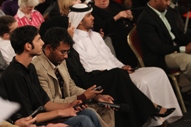 TIM SEBASTIAN
TIM SEBASTIAN
Okay, I get your point. Thank you very much. And now we've reached the point, ladies and gentlemen, when we're going to vote on the motion that ‘This House believes this Afghan government is not worth fighting for'. If you take your voting machines, let me just explain how they work. If you want to vote for the motion, that is the side represented by Peter Galbraith and Mirwais Yasini, you press button one, the ‘yes' button. If you want to vote against the motion, the side represented by Shukria Barakzai and Lawrence Korb, that's button two, the ‘no' button. Whichever one you want to press, please do it now. You only have to press once, thanks to the miracles of modern science, your vote will be communicated to our computers, and we should have it for you in about ten seconds.Right, there it is, 51 percent for the motion, 49 percent against. The motion has been very narrowly carried.
PETER GALBRAITH
But it was an honest vote.
TIM SEBASTIAN
But it was an honest vote. All it remains for me to do is to thank our distinguished speakers for coming. Thank you very much indeed. Thank you to you, the audience, as well, for your questions. The Doha Debates will be back again next month. Till then, from all of us on the team, have a safe journey home. Goodnight, thank you very much. Goodnight.
Watch online

